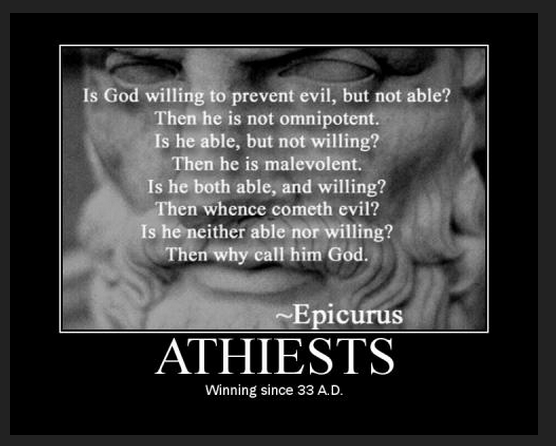kepha31
Active Member
I suggest you read the entire link, Thomistic Approaches for the Existence of God by A.L. ,, and I will submit to the moderators interpretation of plagiarism.Excuse me, but what is this god thing that suddenly got thrown into the mix?
Don't know who this A.L. is, but his rambling ideas got more incomprehensible with every sentence. In particular is his silliness concerning the "First Mover." "the Unmoved First Mover alone answers the true idea of a mover. " I've seen better from freshman philosophy students, but maybe that's what he is.
FYI, Just because it appears on the internet doesn't make it worth repeating.
(Oh yes, quoting to this extent could be interpreted as plagiarism.)
What you find incomprehensible is the first of Thomas Aquinas 5 Ways on the existence of God. Since your position, repeatedly stated by you, is "don't know", how are you in a position to dismiss my post as "rambling ideas... incomprehensible with every sentence"??? Thomas Aquinas 5 Ways are classics, they didn't have the internet in the 12th century. Here is a summary of a summary of a summary that is easier to follow:
First Way: The Argument From Motion
St. Thomas Aquinas, studying the works of the Greek philosopher Aristotle, concluded from common observation that an object that is in motion (e.g. the planets, a rolling stone) is put in motion by some other object or force. From this, Aquinas believes that ultimately there must have been an UNMOVED MOVER (GOD) who first put things in motion. Follow the argument this way:
1) Nothing can move itself.
2) If every object in motion had a mover, then the first object in motion needed a mover.
3) This first mover is the Unmoved Mover, called God.
Seriously, it's not "rambling ideas... incomprehensible with every sentence". It's very simple. It seems to me that making baseless remarks to derail an argument that cannot be refuted is the style of discussion, which is partly why discussion with atheists is nearly impossible. While I am at it:
Second Way: Causation Of Existence
This Way deals with the issue of existence. Aquinas concluded that common sense observation tells us that no object creates itself. In other words, some previous object had to create it. Aquinas believed that ultimately there must have been an UNCAUSED FIRST CAUSE (GOD) who began the chain of existence for all things. Follow the agrument this way:
1) There exists things that are caused (created) by other things.
2) Nothing can be the cause of itself (nothing can create itself.)
3) There can not be an endless string of objects causing other objects to exist.
4) Therefore, ther must be an uncaused first cause called God.
Third Way: Contingent and Necessary Objects
This Way defines two types of objects in the universe: contingent beings and necessary beings. A contingent being is an object that can not exist without a necessary being causing its existence. Aquinas believed that the existence of contingent beings would ultimately necessitate a being which must exist for all of the contingent beings to exist. This being, called a necessary being, is what we call God. Follow the argument this way:
1) Contingent beings are caused.
2) Not every being can be contingent.
3) There must exist a being which is necessary to cause contingent beings.
4) This necessary being is God.
Fourth Way: The Argument From Degrees And Perfection
St. Thomas formulated this Way from a very interesting observation about the qualities of things. For example one may say that of two marble sculptures one is more beautiful than the other. So for these two objects, one has a greater degree of beauty than the next. This is referred to as degrees or gradation of a quality. From this fact Aquinas concluded that for any given quality (e.g. goodness, beauty, knowledge) there must be an perfect standard by which all such qualities are measured. These perfections are contained in God.
Fifth Way: The Argument From Intelligent Design
The final Way that St. Thomas Aquinas speaks of has to do with the observable universe and the order of nature. Aquinas states that common sense tells us that the universe works in such a way, that one can conclude that is was designed by an intelligent designer, God. In other words, all physical laws and the order of nature and life were designed and ordered by God, the intelligent designer.
St. Thomas Aquinas' Five Ways
If you don't like reading all that, watch a video:
Is it my best argument for the existence of God? No, but it's a good one, and more reasonable that the atheists argument by silence for the existence of the universe, and our place and purpose in it.
Last edited:

